A long-held dream becomes reality
There are number of emotions I feel that I can’t put to words as I begin to think on what this trip has meant to me up until this point.
This trip has loomed large for me for years. Since before college I’ve talked of coming to Japan. Now being here I see how the meanings of this trip are composed of the many little logistics of doing, of putting plan into action. I am thinking of my/our efforts, mistakes, fumblings, high energy, exhaustion, confusion, rallying, moments of disconnection and connection, things expected and unexpected. The concreteness of the object, of Japanese life, is now well-defined where it was once dreamy and fuzzy in my head. It doesn’t fulfill deep, fantastical wishes, and neither does it disappoint. It offers a basic gratification, the gratification of simply knowing ‘what is’ and having witnessed it.
In being here I see how this is only the beginning of my relationship with Japan, one encounter. To become more intimate with the country and culture will require something ongoing. It would mean to have a degree of language fluency and time spent living in or frequently visiting the place. These things are not simple to achieve and I feel a little overwhelmed by the process. I wish I could gain or have something deeper, quicker. Raghav reminds me that this is a big step what we’re doing here now, to leave our lives in Chicago to come to Japan for a chunk of time. It’s true. And I remind myself that I have the tools to develop a more satisfying closeness over time.
I think of the parallels in my experiences of learning Spanish language and certain cultures of Latin America. It is like the decisions I’ve made over time to become a social worker, then therapist, then trauma therapist. It is like my commitment to be with Raghav. It is about the gradual progression and the unfolding of the path, not the end desire. There is so much between where you start and where you hope to be. You can only take the step that is there.
The pleasures of being here
It is special to be in Japan. I like hearing small children speaking to their indulgent mothers, and seeing them ride on the backs of their parents’ bicycles. It is a reminder that I did that too nearly 30 years ago in Osaka. It is satisfying when those few Japanese words and sounds emerge effortlessly from my mouth because they are old words to me, even if there is still countless, really endless, amounts of words and sounds that I do not know and are unfamiliar with. I enjoy recognizing my mom’s movements in other women here. I loved Okinawa knowing my mom grew up there. When I visit my parents’ old places I am reminded that they were only a few years younger than me when they had a life here.
I appreciate the way Japanese people take simple pleasure in the little moments and I try to emulate that spirit. I am inspired by the small-ness of Japanese life and the cultural emphasis on that. I admire the preciseness of everything and how that precision is used to enhance public life and strengthen social bonds across society. I feel incredibly at-ease waiting in long lines as I feel how everyone else is at-ease too. There is an unshakeable patience in the people here in the face of delays, slowdowns, and the unusual inconvenience or problem that arises. Being here has offered alternatives to how to conceive of and experience life. I hope to keep some of this with me when we eventually leave.
Low-key tourism pleasures
Spring is here in Japan. It is beautiful and peaceful. Japanese people have a slow and easy way of moving through activities. Recently, Raghav and I took a ferry to the small island of Nokonoshima, off the coast of Fukuoka. It is has a famous attraction, a garden park that blooms with different flowers each season.
Like many tourist attractions that we’ve visited in Japan, the activity is in the act of viewing. The park has several highly curated gardens. There is a small, unmanned “zoo” that includes a large pen full of adorable rabbits who you can observe and feed. There is a park path that winds through different gardens and leads to a small and charming commercial path with small restaurants, and pottery, craft, and souvenir shops. The path ends and opens up into a wide, grassy space with a picnic area. There is a notably “wild-looking” field (at least by Japanese standards) full of yellow nanohana for photo-ops. It is a popular place for engagement photos.
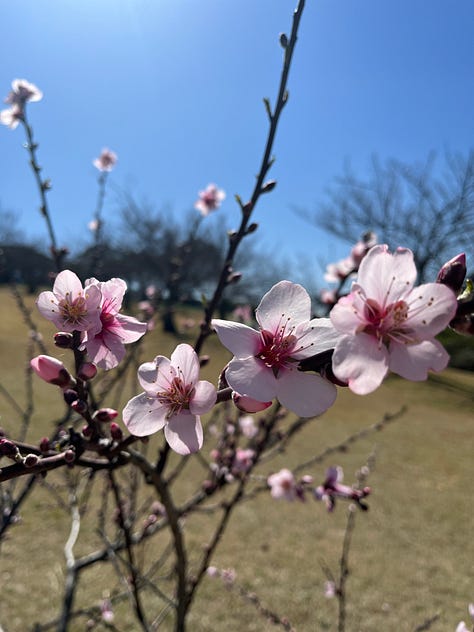
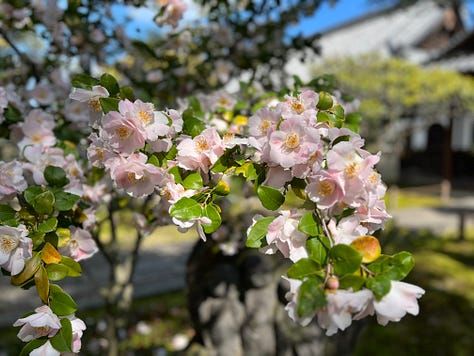
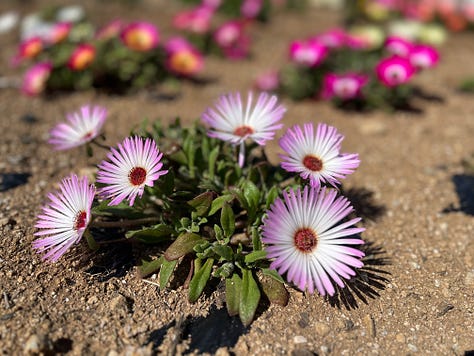
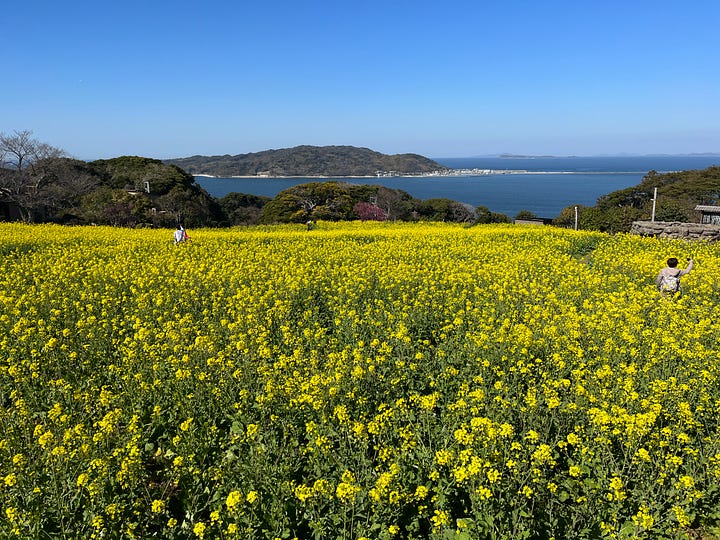
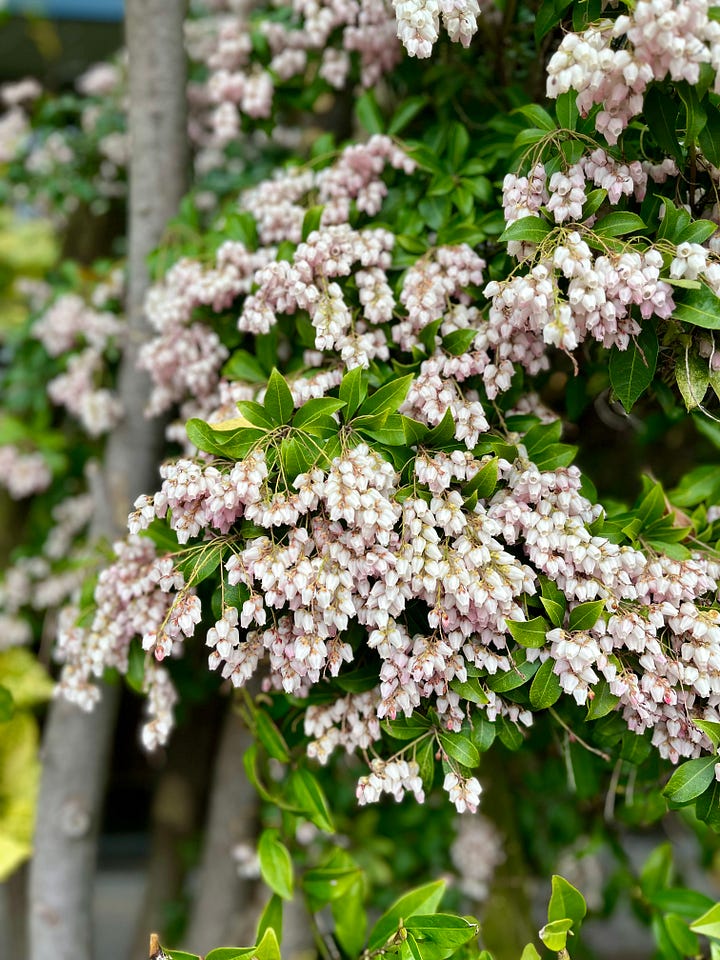
There is a lack of flashy, noisy spectacle in Japanese tourism that I associate with certain kinds of American attractions. I sometimes find myself waiting for the signal that I’ve seen the main attraction, like a bright, glittery sign at the very least. There is a sense of missing the pinnacle.
At Nokonoshima the attraction was to sit, enjoy the outdoors and the view of the sea, and get an ice cream with artfully placed flowers, if so inclined. The enjoyment was not complicated. The pleasure was simple and lacked adrenaline rush and sharp excitement. The restaurants don’t ridiculously up-charge you as a reminder that you’re visiting someplace ‘special’. The food was of quality. It was fresh, healthy, and delicious - food you wanted to purchase and eat. Sitting under that perfect blue sky, on a warm sunny day, the gentle breeze from the sea, the field of beautiful flowers before me, I felt angry at how awful American tourism can be. Up until this point I’ve tried hard not to compare because really, there is no comparison.
Service and serving in Japan
There is a deep belief in service and serving in Japan that is felt in every aspect of daily life. It is in the quality of food just about anywhere you go, whether fast food or fine dining, in a hip urban area or at a random tourist attraction. It is in the incredible accessibility, frequency, efficiency, and comfort of all public transportation. There seems to be a baseline dignity in labor and workforce; an employee at any service counter speaks to you kindly and with concern and sincerity. They address your requests and concerns with efficiency. There are vending machines every other block with cheap and nice and fun drinks that are less than a dollar. Having pocket change actually means something here because you can literally buy food and drink and other goods with that change. There is a courier service (actually one of many such services) that sends your suitcase hundreds of miles in a matter of 24 hours, all for less than fifteen dollars. You drop your luggage at any convenience store, fill out paperwork, and a delivery service will pick it up and drop it off wherever you indicate. When you fly, you get through check-in and security (and even immigration) in twenty minutes. Every. Time. And then there is the way that people always comport themselves that is conscious and noticing of others. It means there’s no litter, no disruptions, a sense of responsibility to others when you’re outside your home and all that that implies. All of this has opened my eyes to a way of cooperative and peaceful living that I wouldn’t have thought possible.



Enjoyed reading your post Tatum. The "dream as a journey" really resonated with me, as well as the Japanese commitment to serve and service -- something I wish was stronger ethic in the states. This trip seemed to pull together some parts of your life and made it a bigger whole. Enjoy the final couple weeks there.
I really enjoyed reading this post, Tatum! Thank you for sharing so deeply and vulnerably with us throughout your trip. These lines in particular struck me for a number of reasons: "It is about the gradual progression and the unfolding of the path, not the end desire. There is so much between where you start and where you hope to be. You can only take the step that is there." It resonated with me at this stage in time when I am taking the small steps in front of me, one at a time. It also makes me think of how to live presently.
I also appreciated your reflections on what living consciously and with a value towards the collective looks like in daily life in Japan